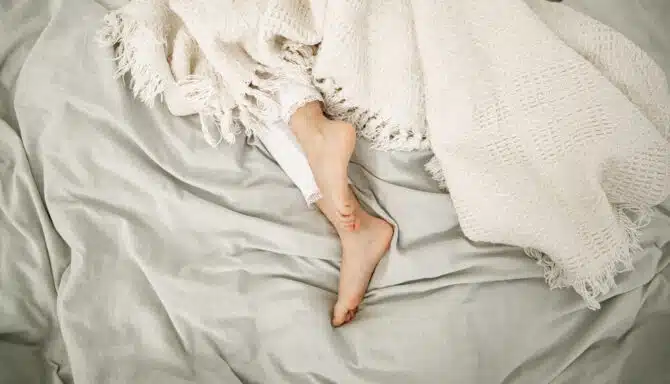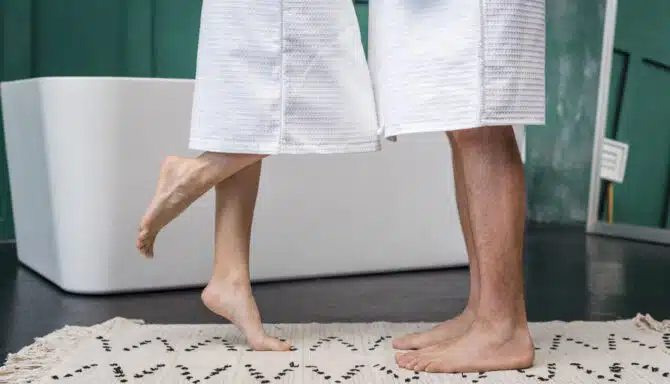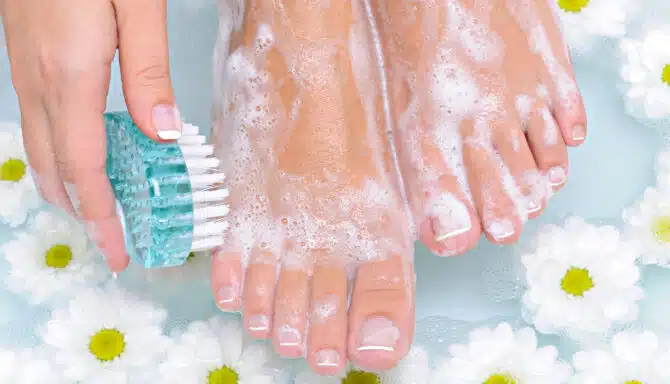January 23, 2025
There are plenty of myths about foot odor. From thinking it only happens in hot weather to assuming those who struggle with it must not bathe or shower, it’s a foot condition that can be difficult to understand and affect our confidence. You may also wonder if foot odor is a serious problem and when to see a foot specialist, like a podiatrist or chiropodist, about it. On the other hand, you may be able to tackle it on your own. Today we’ll talk in depth about when you might need some extra help with your foot odor.
What is Foot Odor?
https://www.youtube.com/watch?v=meO8VW1yxJ4
Foot odor is the unpleasant smell that arises from the feet. The main cause of foot odor is the excessive perspiration of the feet combining with bacteria, often occurring in areas where sweat accumulates the most, such as inside shoes or socks. This creates an ideal environment for bacteria to thrive.
Fun fact: human sweat itself is almost entirely odorless! Odors arise when it interacts with bacteria present on the skin, particularly on the soles and between the toes, forming odorous substances. This breakdown process produces an array of compounds, including acids, ammonia, and sulfur-based compounds, which are responsible for the characteristic smell.
Persistent Foot Odor Causes and How to Prevent Foot Odor
One condition that exacerbates foot odor is plantar hyperhidrosis, a condition where the sweat glands on the soles of the feet produce excessive amounts of sweat. When the feet sweat excessively, the increased moisture fosters a more conducive environment for the growth of bacteria, contributing to stronger foot odor.
This is a medical condition that often requires intervention to manage the excess sweating. Treatment options include topical antiperspirants, double layered cotton socks and Anticholinergic creams. A podiatrist or a chiropodist can also recommend absorbent insoles and give you advice on how to practice proper foot hygiene, which should include washing with an antibacterial soap, thoroughly drying, and applying foot powder or antifungal powder.
In addition to plantar hyperhidrosis, several other factors and health issues can contribute to foot odor:
Fungal Infections
Fungal infections, such as athlete's foot, thrive in warm, damp environments, which is why sweaty feet are more prone to infection. These infections can cause itching, burning, and peeling skin, alongside a musty odor due to the fungus feeding on skin cells.
Diabetes
Foot odor can be a serious concern for individuals with diabetes, as it might signal an infected wound or a diabetic ulcer, particularly in the toes or feet. Due to reduced circulation and nerve damage associated with diabetes, wounds can go unnoticed, and the risk of infection increases. The presence of odor may indicate that an infection is developing, which requires prompt medical attention to prevent complications such as cellulitis or gangrene.
Poor Circulation
Poor circulation can lead to excessive sweating as the body tries to regulate temperature. However, insufficient blood flow also prevents the proper removal of toxins, causing a build-up of bacteria that contributes to foot odor. It’s important to try and improve your circulation as much as possible: one way you can do so is with exercises that help with circulation in the winter time.
Hormonal Imbalances
Conditions such as pregnancy, menopause, or thyroid disorders can cause hormonal changes that influence sweat production. These fluctuations in hormones can trigger excessive sweating, creating an environment that supports bacterial growth and results in stronger foot odor.
Lifestyle and Diet
Poor foot hygiene or wearing shoes that do not allow the feet to breathe can trap moisture and heat, promoting bacterial growth that causes odor.
It’s important to wear waterproof shoes, especially in the winter time, to ensure excess moisture doesn’t build up and disrupt a healthy shoe environment. Moisture wicking socks are another great way to be vigilant against foot odor, in addition to regularly changing your socks throughout the day and keeping your feet nice and clean, which we discussed earlier.
Diets high in spicy foods, alcohol, or caffeine can also increase sweating and contribute to foot odor.
https://www.youtube.com/shorts/R7GV0GbKhvQ
Is My Foot Odor A Serious Problem?
In general, foot odor is harmless and can be managed with good hygiene. But it can become a serious issue when it signals an underlying health problem, especially if it's persistent, worsens over time, or has a particularly foul smell that differs from the typical cheesy, vinegary or sweaty smells we all recognize in foot odor.
When combined with other symptoms such as redness, swelling, pain, or itching, it could indicate an infection like athlete's foot or cellulitis. If the odor is accompanied by open sores, blisters, peeling skin, or wounds that don't heal, it's important to pay attention to these signs as they may point to infections or worsening diabetic neuropathy that requires a prompt visit with a chiropodist or podiatrist. This is also crucial if your foot odour is accompanied by other concerning symptoms, such as a change in skin colour. Typically, it will be obvious if a pungent smell is radiating from a wound instead of just your feet, so in this case, treat the odor as an urgent matter.
When To See A Foot Specialist For Foot Odor
https://www.youtube.com/shorts/sBIdll7qylQ
If you’re unsure whether your foot odor is linked to a more severe issue, it’s a good idea to consult a healthcare professional for a thorough evaluation, and see a chiropodist at a foot clinic.
These experts can help identify the root cause of persistent odor, whether it’s fungal, bacterial, or linked to a medical condition like diabetes or plantar hyperhidrosis. They can also recommend effective options tailored to your specific needs, such as prescription topical solutions, high-quality creams and powders, advice on managing excess sweat, footwear recommendations, and more. Foot specialists are trained to spot subtle signs that might go unnoticed and can offer targeted solutions and tailored treatment plans that go beyond home remedies.
Seeing a foot specialist can also help you better manage foot odor linked to chronic conditions. For example, if you have diabetes or poor circulation, a chiropodist can advise you on preventative measures to avoid complications like infection or wound degradation. If you’re experiencing frequent or severe foot odor, don’t wait for it to escalate—getting professional help early can ensure that any underlying issues are addressed promptly and effectively.
November 30, 2024
Holiday shopping can feel like a daunting ordeal that takes away from all the fun. Your list is long, and you don't have ideas for some people - which is okay! But it doesn't have to cause so much stress. We've got you covered with our guide to the best foot care holiday gifts!
When you're stuck on what gift to get for your grandparents, friends, and other relatives, medical gifts may inspire you more than you realize. The health and wellness industry is known for producing excellent products, opening your mind to many gift options.
Gifts that promote foot health can help those with debilitating foot issues. But they can also help prevent foot conditions before they develop. And they're simply fun to use. We're talking foot creams, scrubs, and other luxurious products fit for a spa session!
The gifts we'll discuss today focus on both skincare and foot pain; they shine on their own and work well as stocking stuffers. But the best way to gift products from a foot care clinic is by compiling a foot care gift set! It's fun to try more than one product, and it gives loved ones the tools for a great self-care day. Let's take a look at our top picks!
Foot Care and Medical Gifts: Gift Guide 2024
Below is a general overview of our top foot care holiday gifts. But don't worry, we'll cover all the details.
Foot Exfoliators
Foot Creams & Moisturizers
Superfeet Insoles
Feet First Clinic Gift Certificates
Foot Exfoliators
Foot Scrubs & Foot Baths
Products like Gehwol's Herbal Bath are affordable medical gifts to raise your loved ones' foot care game to the next level. They're suitable for people of all ages and help exfoliate and soothe dry skin. Exfoliation prevents itchy, flaky dead skin from building up while simultaneously unclogging your pores. Exfoliating your feet weekly will help prevent and treat any callus buildup and cracked heels, while keeping your feet soft and moisturized.
But foot baths do even more for the body than you may realize. First, foot bath products combined with hot water help promote healthy blood flow, which can relieve pain from foot conditions like plantar fasciitis, bunions, etc. They can also warm your overall body temperature, which alleviates muscle tension, reduces stress, and may help prevent sickness or fight flu symptoms by strengthening your natural immunity (perfect for the winter!).
Helpful tip: It's best to start a spa session by bathing your feet, as it leaves a clean base for exfoliation and moisturizing by washing away bacteria and dirt.
Foot Files
Feet First Clinic's foot files are another great way to exfoliate your feet! You can gift someone a foot file as a stocking stuffer or as part of a gift box (throw in the Gehwol Herbal Foot Bath and some foot cream for the perfect foot care selection!).
But why do we need them?
Foot files remove hard, scaly dead skin from the bottom of the foot, making them feel silky smooth. Our foot files also have a smoothing side to buff and soften the skin. This allows you to customize and control where and how much skin you remove when exfoliating your feet (unlike the foot peels you see online). The perfect tool for concluding a luxurious at-home foot care session, you should give them some consideration as you shop for medical gifts.
View this post on Instagram
A post shared by Feet First Clinic (@feetfirstclinic_)
Foot Creams & Moisturizers
Gehwol Foot Creams
To restore the skin's natural barrier functions, you should always moisturize after soaking and exfoliating. Gehwol's Soft Feet Cream, Universal Foot Cream, and Med Lipidro Cream are just a few examples of medicinal moisturizers that work wonders. So why not gift them to someone you love? They'll get to enjoy smooth skin and fewer cracks and calluses.
If your loved one already has severely painful cracked heels, try gifting them Gehwol's Med Salve for Cracked Skin or Dermal Therapy Heel Care instead.
Dermal Therapy Heel Care
Hopefully, it's becoming clear that medical gifts can be more valuable than gifts that sit around collecting dust. And Dermal Therapy Heel Care is one of the best foot care holiday gifts around.
Cracked heels have the potential to burden everyone, from your best friend to your grandmother - dry skin doesn't discriminate! Severely cracked heels can make walking almost unbearable and cause swelling, inflammation, and bleeding. So if you're catching wind that someone you love is suffering, why not brighten their holidays by gifting them some relief?
Dermal Therapy helps skin cells deep below the surface absorb and lock in moisture, which fights cracked heels. It has the highest urea concentration (25%) of all the foot creams we carry. Urea is important because it works into the deeper layers of the skin to help skin both absorb and retain moisture. To top it off, dermal therapy is a moisturizer and exfoliator that removes dead cells, revealing fresh, young skin.
Superfeet Insoles
As far as medical gifts for healthy feet go, Superfeet insoles are a wonderful route to take. The general use of their most popular colour, green, is to provide extra support for people with flat feet, plantar fasciitis and other types of foot pain. And for those who want the same arch support as the flagship Superfeet Green, but with more cushioning and flexibility, you can get the Superfeet Run Cushion High Arch insoles - a new favourite and best seller at our Toronto foot clinic!
But if you have a loved one with more specific needs, worry not!
Superfeet produces several insoles with colours that indicate how they stand out. For example, Superfeet Berry is made specifically for women and comes with a slimmer heel and an arch length to fit the proportions of the female foot. And Superfeet Black is a versatile, low-profile option for people with flat feet. And that’s just the beginning!
November 7, 2024
Foot odor is a frustrating problem; it goes to show that non-painful foot conditions can be as life altering as painful ones. There are many foot odor myths floating around the internet. In this article, we'll break down some of the most common foot odor myths, and give you the facts about foot odor causes and how to prevent it.
6 Myths About Foot Odor:
Only People With Sweaty Feet Have Foot Odor
Foot Odor Always Means You Have a Serious Health Condition
All Foot Odor Smells the Same
Going Barefoot Helps Eliminate Odor
If You Have Foot Odor, you Aren’t Showering or Bathing
Foot Odor Only Happens in Hot Weather
Myth 1: Only People With Sweaty Feet Have Foot Odor
Foot odor, also known as bromodosis, is the unpleasant smell that comes from the feet due to a combination of sweat and bacteria. The feet have numerous sweat glands, which produce moisture to regulate temperature and prevent skin from drying out. Plantar hyperhidrosis is the medical term for excessively sweaty feet. Sweat is a major contributor to foot odor and provides the moisture needed for it to thrive, however, other factors are also at play.
The Main Causes of Foot Odor
General bacterial buildup and everyday life! (wearing shoes all day long, etc).
Fungal infections: Conditions like athlete’s foot can lead to odor as fungi produce waste products during growth.
Diet: Certain foods, like garlic and onions, can affect sweat composition and lead to a noticeable foot odor.
Health conditions: Conditions other than plantar hyperhidrosis can cause foot odor, including diabetes, particularly when ulcers and wounds omit a strong smell. Other conditions include thyroid disorders (they may cause excessive sweating) or kidney and liver issues.
Footwear material: Shoes made from non-breathable materials trap even normal sweat production, increasing moisture and bacterial growth. Preventing foot odor often means choosing breathable, waterproof shoes.
Hormonal changes: Puberty, pregnancy, or menopause can contribute to foot odor.
https://www.youtube.com/shorts/1aaNATnXvWw
Foot Odor Myth # 2: Foot Odor Always Means You Have a Serious Health Condition
It’s true that one of the causes of foot odor can be an underlying health condition, but that doesn't mean it's serious. The most common cause of foot odor is a general build up of sweat and bacteria that you can tackle yourself.
Foot odor is often caused by everyday factors like wearing shoes made from non-breathable materials or not changing socks frequently enough. In most cases, simple steps like improving hygiene, airing out shoes, or using foot deodorants (sprays, powders or creams) can help control the smell.
While it's important to be mindful of persistent odor or other accompanying symptoms, the vast majority of foot odor issues are easily managed with at-home care and do not indicate a serious health condition.
https://www.youtube.com/shorts/aFdZ042koME
Foot Odor Myth # 3: All Foot Odor Smells the Same
Foot odor can vary significantly based on several factors, including the underlying cause, personal hygiene, diet, and the type of bacteria or fungi present. For example, open wounds and sores will smell different than smelly, sweaty shoes. Here are some common smells:
Sour: Often caused by bacteria breaking down sweat, resulting in lactic acid production.
Musty: May be associated with fungal infections or warm, moist environments.
Vinegar-like: Often linked to sweat and potentially neglectful hygiene.
Ammonia: May indicate dehydration or a dietary imbalance.
Rotten: This odor can be a sign of a more serious infection.
Foot Odor Myth 4: Going Barefoot Helps Eliminate Odor
While going barefoot might seem like a good idea for reducing foot odor, it can actually have the opposite effect in some cases. While it’s always good to air out your feet, going barefoot outside exposes your feet to various surfaces that may harbour bacteria and fungi. Walking on dirty or damp surfaces can lead to the accumulation of these microorganisms, potentially worsening foot odor. In fact, foot fungus (one of the most common causes of foot odor) is often caused by walking barefoot in public places.
Additionally, sweat can still pool in the crevices of your feet without socks and shoes, allowing bacteria to thrive. Instead of eliminating odor, going barefoot may introduce new sources of smell. Wearing breathable footwear and moisture-wicking socks and changing them regularly is a much better idea.
Myth 5: If You Have Foot Odor, You Aren’t Showering or Bathing
This is completely untrue since foot odor is often linked to other conditions like plantar hyperhidrosis and fungal infections. Therefore, foot odor is is a symptom rather than a cause. It also often develops throughout the day, so you can shower every morning and still experience smelly feet when you get home at night.
That said, you should pay more attention to foot-specific hygiene and clean your feet frequently. Check out this blog article on foot hygiene tips to learn what to do.
Myth 6: Foot Odor Only Happens in Hot Weather
Foot odor is commonly associated with hot weather, but it can occur year-round, regardless of the temperature. While warm conditions can exacerbate sweating and create a breeding ground for bacteria, factors such as personal hygiene, footwear choice, and lifestyle also play significant roles in foot odor.
For example, wearing insulated shoes in fall or winter weather can trap moisture and heat, leading to odor even when temperatures are low. Additionally, individuals who sweat excessively—regardless of the season—are more likely to experience foot odor. Therefore, it’s essential to maintain proper foot care and hygiene practices throughout the year to prevent odor, not just during the warmer months.
https://youtube.com/shorts/meO8VW1yxJ4?si=EQb3gbihQ8E6-E0j
May 23, 2024
One thing many of us forget about until it hits is the annoyance of having hot feet in the summer. The blazing sun, your enclosed running shoes, and spending hours outside can really crank up the heat on your feet, making them feel downright uncomfortable. That's where summer foot care comes in handy. You'll definitely want some cooling foot treatments ready for when your feet get hot, and luckily, we’ve got you covered.
Best Summer Foot Care Cooling Foot Treatments
Foot Soaks
Foot Creams
Foot Gels / Aloe Vera
Cold Towel Wraps
Ice Packs
Foot Ice Pack Wrap
Foot Massagers
Cold Water Soaks
Foot Soaks
On a hot summer day, refreshing foot soaks are always the way to go! Prepare your foot bath with relaxing lukewarm water (hot water can be damaging to the skin, and your feet are too warm for that anyway!) and add your foot soak product of choice for added benefits. Try Gehwol’s Herbal Foot Bath for the most well-rounded experience! This will also soothe tired, aching feet.
Foot Gels / Aloe Vera
Gels may also be exactly what your stifled feet need. You can try gels with aloe vera, which is naturally hydrating due to its high water content. Aloe vera also evaporates quickly when applied to the skin, providing fast relief.
Cold Towel Wraps
Sometimes you have exactly what you need waiting for you at home! To cool down, soak a towel in cold water, wring it out, and wrap it around your feet. This method is simple and can be very refreshing.
Foot Creams
One of the best foot pampering tips is moisturizing your feet with high-quality creams. Not only do these products protect against dry skin, foot odour, calluses, corns, cracked heels, and more, but the cream also has a pleasant cooling effect. Look for creams with eucalyptus or menthol, which both have added cooling and soothing capabilities. Gehwol’s Extra Universal Foot Cream contains those two additional ingredients.
Ice Packs
Ice packs aren’t just for pain relief! You can use a cold ice pack, gel pack, or frozen water bottle to cool your feet during the hot summer days and nights. Wrap these items in a towel first to avoid making a mess!
Foot Ice Pack Wrap
These are essentially ice packs that cover your whole foot and have the appearance of a shoe, slipper or ankle brace. They may work for cooling hot feet, but also treating painful foot conditions.
Foot Massagers
Some electric foot massagers come with a cooling option that can help relax and cool your feet simultaneously. To get the same effect, you can use a small fan and position it so it faces your feet!
Cold Water Soak
Foot baths are generally used with warm to lukewarm water, but combining cold water with Epsom salt or your favourite foot soak product in a basin can have a more cooling effect than warm water, the latter of which is better suited for boosting blood circulation and pain management.
May 9, 2024
One often overlooked but crucial aspect of personal hygiene is foot care. Your feet carry you through countless activities but don't always receive the attention they deserve when it comes to cleanliness. In this article, we delve into the importance of foot hygiene and tips for keeping feet clean and healthy. From simple daily practices to preventing infections, we’ll explore this aspect of foot health care together.
Wash Your Feet Daily
First thing’s first, lather up your feet! Use mild soap every day to wash your feet either on their own or while in the shower or bath tub. This not only eliminates dirt and keeps your feet feeling fresh, but if you come in contact with tinea pedis soap and water may be able remove the fungus before it becomes athlete’s foot.
Keep Your Feet Dry
If you fail to keep your feet dry you’re welcoming a wide array of issues. Not only does moisture cause foot odour, but it also creates the type of environment foot fungi love and thrive in. It also leads to skin maceration, blisters, cracking, and peeling. Give your feet a good dry with a nice soft towel. Pay extra attention to the hard-to-reach areas in between the toes, and to go the extra mile, let them bask in the air or in front of a fan.
Moisturize Your Feet
Moisturizing hydrates the feet and fights excessively dry skin. When your skin is too dry it can create fissures and cracks that welcome dirt. So, while keeping your feet dry is essential, remember not to overdo it and turn them into the Sahara Desert!
Wear Clean Socks and Rotate Footwear
Keeping your feet cooped up in dirty socks is a recipe for persistent foot odour and moisture. For the ultimate foot refresh while on the go, change your socks throughout the day.
This also applies to your footwear, especially for less breathable shoes. To avoid having to change your footwear all the time, look for light runners and walkers with perforated holes that let fresh air in and out.
Trim Your Toenails
You may be wondering what your toenails have to do with foot hygiene. Trimmed toenails are less likely to harbour dirt and fungus, while also looking great! Jagged edges and too-long nails can also pierce your socks, which ruins their protective purpose. Learn how to trim your nails like a pro here.
Protect Your Feet in Public Areas
Swimming pools, locker rooms, communal showers — you’re putting yourself at risk of contracting a fungal infection if you frequent these places. If you can’t avoid them, protect your feet with shower shoes and flip flops to keep funky fungi at bay!
March 21, 2024
Foot hygiene and solid foot care tips are your secret weapons for happy and healthy feet! Everyone should practice a clean and healthy foot routine, but those with foot conditions such as diabetes or chronic fungal infections should be extra vigilant. Today we’ll talk about the best foot cleaning practices and how to implement them into your daily foot care routine.
Foot Health Essentials: How to Keep Your Feet Clean and Protected
Foot hygiene is pretty straightforward stuff! But you may make some minor missteps along the way. Take a look below at the best ways to wash, dry and moisturize your feet.
Washing Your Feet
Wash your feet daily with natural, gentle soaps in warm water. Hot water can negatively impact your blood circulation by increasing the size of the blood vessels, so be careful with temperatures. After, pat your feet dry- especially between your toes.
Moisturizing Your Feet
Use lotion on the bottom and top of your feet. This can help you prevent calluses, corns, cracked heels, and more. Natural, fragrance-free and medicinal lotions are your best bet. Be careful to avoid putting lotion in between your toes; it could cause an infection depending on the lotion. Fungal infections also favour wet toes and tend to appear there.
https://youtube.com/shorts/JkHzT9z8fiU?si=4wXwdH1vCWc_msiI
Keeping Your Feet Dry
Thoroughly dry your feet after washing them. If you get lazy and keep them damp, you are again more likely to attract contagious fungal infections (they love moist environments!).
Invest in products that help manage foot dampness and repel excess moisture. These include moisture-wicking socks (also remember to change your sock frequently!), waterproof shoes and boots, running shoes with perforated holes in the uppers, and various foot deodorant products (creams, powders, sprays). These products are also great for preventing foot odour.
https://youtube.com/shorts/meO8VW1yxJ4?si=vq0tn2Pzqze-F1QP
Toenail Care and Foot Hygiene
Keeping your nails in top shape is an important element of foot hygiene. Follow these nail care tips to protect your nails and keep them clean and strong.
Cut your nails straight across with high-quality nail clippers. Don’t try to shape them during this stage!
Avoid cutting your nails too close to the skin; this will cause ingrown toenails.
Gently use a nail file for subtle shaping.
Don’t cut or push down your own cuticles. They protect the nails and getting rid of them improperly may welcome fungi and increase the chance of a bacterial infection.
Schedule a medical pedicure for professional care and a cleaning of hard-to-reach areas.






